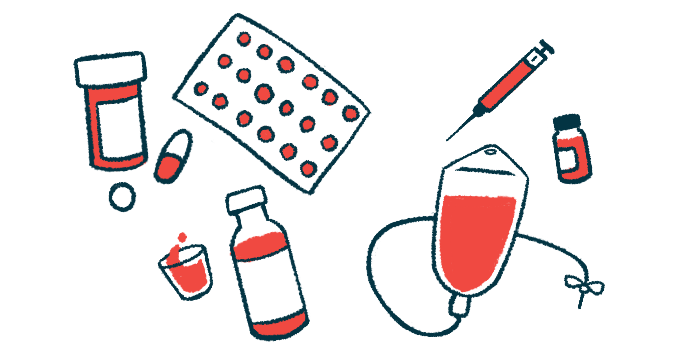SLE patients may have reduced response to COVID-19 vaccination
Some immunosuppressive treatments also have an effect, study finds
Written by |

Patients with systemic lupus erythematosus (SLE) have a reduced response to COVID-19 vaccination, an effect made worse by specific immunosuppressive treatments, a recent study reports.
A reduced response was demonstrated by lower levels of immunoglobulin G (IgG) against the spike protein of SARS-CoV-2, the virus that causes COVID-19. IgG is a type of antibody produced in response to specific pathogens, or disease-causing agents.
The use of the immunosuppressant medications CellCept (mycophenolate mofetil), tacrolimus and Benlysta (belimumab) significantly reduced IgG levels after vaccination.
“Holding mycophenolate for one week improved vaccine efficacy, providing clinical benefit on vaccine response without leading to clinical flares,” the researchers wrote.
The study, “Effect of Systemic Lupus and Immunosuppressives on COVID Vaccination Antibody Response,” was published in the Journal Arthritis Care and Research.
SLE, the most common form of lupus, is an autoimmune inflammatory disease that can affect multiple body systems. Treatment depends on the specific symptoms and organs involved, with immunosuppressant, corticosteroid, antimalarial, and non-steroid anti-inflammatory medicines often recommended.
SLE is associated with a higher risk of severe COVID-19, meaning disease requiring hospitalization, intensive care unit stay, or intubation, both before or after vaccination. Also, some immunosuppressive medications, that typically inhibit immune responses, might worsen COVID-19 infection and decrease the efficacy of vaccination.
The American College of Rheumatology suggested management strategies on handling immunosuppressive therapies, but the benefit of such strategies is yet to be proven due to a lack of studies.
Study design
To learn more, researchers from the John Hopkins Lupus Center in Baltimore, Maryland, collected information regarding COVID-19 infection, vaccination, and vaccine responses in a group of lupus patients and compared them with a group of healthcare workers. They also tested the effect of their policy of holding some immunosuppressant therapies at the time of vaccination on patients’ vaccine response.
In total, researchers analyzed 365 observations in 334 SLE patients, and 2,235 observations in 1,887 healthcare workers. There were more women (92% vs. 80%) and African-American individuals (34% vs. 5%) in the patients group than in the healthcare workers group.
Most healthcare workers were vaccinated with the Pfizer COVID-19 vaccine (81%). The remainder received the Moderna vaccine. In contrast, about half of the individuals in the patients group received the Pfizer (59%) vaccine and 41% Moderna.
The levels of SARS-CoV-2 IgG levels for the virus spike protein were significantly lower shortly after vaccination in SLE patients compared with the healthcare workers group, but over time IgG levels in both groups became more similar.
Specifically, between 14 and 59 days after vaccination, patients had a mean IgG level of 7.4, while healthcare workers had a mean IgG level of 8.9. However, 180 days after vaccination, mean IgG levels were about 5.0 in both groups.
Among SLE patients, men had a significantly lower IgG level compared with women (4.1 vs. 5.7). In general, immunosuppressive treatments were associated with a significant reduction in mean antibody levels (5.8 in those not taking immunosuppressants vs, 5.0 in those taking these medications).
Specifically, a prednisone dose of 10 mg per day or more at the time of vaccination, was associated with a significant reduction in mean antibody levels (5.9 in patients not taking the medication, 4.5 in those taking a dose lower than 10 mg/day, and 3.6 in those taking a dose of 10 mg/day or higher).
A lower vaccine response also occurred in patients undergoing treatment with CellCept, tacrolimus, and Benlysta at the time of vaccination.
However, holding treatment with CellCept for just one week significantly improved vaccine response, with mean SARS-CoV-2 spike protein IgG levels rising from a mean of 2.3 in patients taking a high dose of the medication at the time of vaccination, to 5.2 in those in whom treatment was held. Holding azathioprine and methotrexate, however, had no benefit.
Yet, withholding immunosuppressants had no significant effect on disease activity comparing the time before the first vaccine dose with the period immediately following the second vaccine dose.
No increase in lupus flares
“Importantly, holding immunosuppressive drugs for one week did not increase lupus flares,” the researchers wrote.
“This is the first multiple variable analysis of the effect of immunosuppressive treatments and doses on COVID vaccine response,” the researchers wrote, noting that “mycophenolate [dose higher than] 1000 mg/day, tacrolimus and belimumab are the immunosuppressives that have the most impact on response to vaccination.”
“Our data clearly showed the benefit of our policy to hold mycophenolate mofetil on the day of and for one week after the mRNA vaccine. We were able to do this without increasing [disease] activity or flares,” they wrote.





